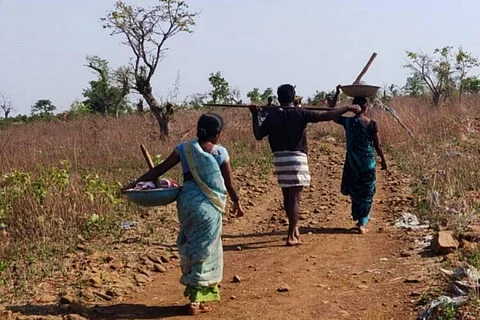

In Telangana, Rs 33 crore of wages under the MGNREGA (Mahatma Gandhi National Rural Employment Guarantee Act) scheme is pending in the Financial Year 2020-21 because of technical reasons, according to an analysis by LibTech India, a team of engineers, social workers, and social scientists working towards improving public service delivery in India. The team analysed publicly available data on MGNREGA and found that 6.31 lakh people were added to the workforce this year, accounting for about 3 lakh new job cards (one job card is issued per family.)
MGNREGA mandates that workers be paid within 15 days of completion of work. “However, wage payments often don’t reach the worker’s account due to technical reasons,” LibTech’s report said. “In Telangana, these technical reasons are categorised as ‘Rejected’ or ‘Suspended’. Rejected payments are those that are initiated from the Centre, but are rejected due to technical errors like data entry — like a bounced check. Suspended Payments occur when there are no Aadhaar or bank account details mapped to the worker’s Job Card. A worker’s subsequent wage payments will also continue to get rejected/suspended if the error is not identified and resolved, and they will not receive any wages under MGNREGA.”
This year, the ‘Rejected’ payments amount to Rs 30 crore (3 lakh transactions), and the ‘Suspended’ payments add up to Rs 3 crore (20,000 workers).
“The problem lies with the banks,” says B Chakradhar, Program Officer with LibTech India. While most bank accounts are linked with Aadhaar, several of the bank accounts are not linked to the National Payments Corporation of India (NPCI) for receiving Direct Benefit Transfer (DBT). “This is not done at the local level as it may be a branch problem or a bank problem, thus the wages get rejected,” he says.
”If a person has not been part of MGNREGA work for a couple of years but is mentioned in the job card of the household, often their Aadhaar and bank details will not be collected by the Field Assistants. But this year they showed up for work and some considerations were made to allow them to work, but most haven’t received their wages yet,” Chakradhar adds.
Telangana government in March 2020 terminated the service of 7,561 Field Assistants across 32 districts for the NREGA scheme. The Field Assistants operate at a gram panchayath level, where they coordinate between the workers and government officials. They are the ones who inform district administration if there is a demand for work among locals under the MGNREGA scheme.
Telangana has so far issued 53.45 lakh job cards. In the current year, the state enrolled 2,94,262 new job cards. The number of enrollments amounts to 5.5% of all job cards issued since the launch of the scheme in the state. Districts such as Kamareddy, Sangareddy, Rangareddy, and Nizamabad added the most number of job cards while districts such as J Bhopalapally, K Bheem, and Mancherial, added the least, found the report.
"There is a huge demand for the MGNREGA work as a lot of people have returned to their villages due to the COVID-19 pandemic and job losses due to the lockdown," says Chakradhar.
Apart from the higher enrollment of workers and job cards the state has also recorded an increase in employment generated under the scheme by 27.2%.
Among districts, Kamareddy generated the most employment while Medchal generated the least. All districts except Peddapalli, J. Bhopalapally, and Warangal (Urban) generated more employment this financial year as compared the past two years, found the report.
The data also shows that more men have availed jobs under the scheme this year, resulting in the reduction in the percentage of women employed under the scheme. Telangana is one of few states where traditionally more women have used the job scheme. The percentage of employment generated by women availing the scheme dropped from 61.50 % in FY 2019-20 to 58.16 % for the present FY.
"This doesn’t mean that fewer women are taking part, it just means that the proportion of men taking part in the scheme has increased," explains Chakradhar.
Regarding workers from Scheduled Caste and Scheduled Tribe communities, the report says, “SC and ST participation in Telangana have tended to be higher than the national average, and both increased this year. SC Person Days saw an increase of more than 70 lakhs, and an increase of 12.95% in share of total Person Days. The share of ST employment in particular saw an increase of nearly 13% this year, and an increase of 85 lakh Person Days.”